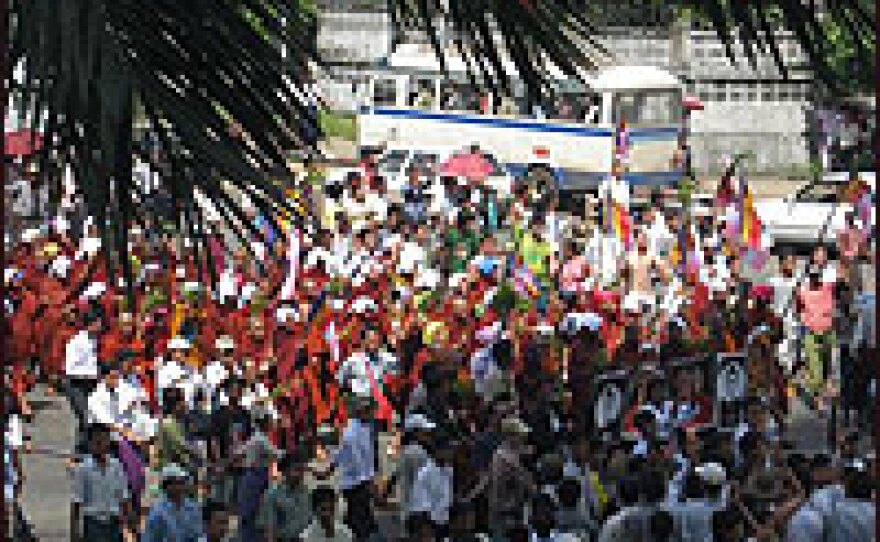
Riot police in Myanmar shot and killed at least one anti-government activist and wounded three others as security forces launched a crackdown on protests, beating and arresting dozens of Buddhist monks and dissidents, the government said.
Dissident groups said up to eight people had been killed.
In an announcement on state radio and television, the country's military government acknowledged the use of force. The report said security forces had opened fire after a crowd of 10,000 people, including what it described as "so-called monks," who failed to disperse at Yangon's Sule Pagoda. It said police used minimum force.
The dead man, age 30, was hit by a bullet, the statement said. It also said two men, aged 25 and 27, and a 47-year-old woman suffered wounds when police fired, but did not specify their injuries.
Meanwhile, Khim Maung Win, deputy editor of the Democratic Voice of Burma, a small anti-junta broadcaster based in Oslo, Norway, said eight people — five monks and three civilians — were reported killed and at least four seriously wounded.
The situation has alarmed the international community. The United States and the European Union condemned the attacks and called on the military rulers to open a dialogue with pro-democracy leaders, including detained opposition leader Aung San Suu Kyi, according to a joint statement on the sidelines of the U.N. General Assembly.
President Bush on Tuesday announced new U.S. sanctions against Myanmar, formerly known as Burma, accusing the military dictatorship of imposing "a 19-year reign of fear" that denies basic freedoms of speech, assembly and worship.
Myanmar's junta had banned public gatherings of more than five people and imposed a nighttime curfew following days of marches led by the monks — the largest such gatherings since a bloody crackdown in 1988, when security forces fired into peaceful demonstrations, killing thousands of people.
Myanmar Faces Further Alienation
Others speaking out against the crackdown included the Dalai Lama and South Africa's Archbishop Desmond Tutu, both Nobel Peace Prize laureates like Suu Kyi.
The EU also threatened to strengthen existing sanctions against the regime if it uses violence to put down the demonstrations.
On Wednesday, about 5,000 monks and 5,000 students along with members of Suu Kyi's National League for Democracy set off from Shwedagon to the Sule Pagoda in the heart of Myanmar's largest city, but were blocked by military trucks along the route.
Other protesters at the Sule Pagoda were confronted by warning shots.
Some carried flags emblazoned with the fighting peacock, a symbol of the democracy movement in Myanmar. The march proceeded quietly with protesters praying rather than chanting.
Hundreds Arrested
About 100 monks stayed behind at the eastern gate of the Shwedagon Pagoda, refusing to obey orders to disperse after riot police failed to dislodge them despite employing tear gas, batons and warning shots.
Witnesses said an angry mob at the pagoda set fire to two police motorcycles.
A branch of the National League for Democracy exiled in Thailand said the arrests in Yangon numbered 300, most of them in a western suburb of the city. The number could not be independently confirmed.
In Myanmar's second largest city of Mandalay, more than 100 soldiers armed with assault rifles deployed around the Mahamuni Paya Pagoda.
"We are so afraid; the soldiers are ready to fire on civilians at any time," a man near the pagoda told The Associated Press, asking that his name not be used.
The protests could bring increased scrutiny on China's close relations with Myanmar. China is the country's major trading partner and Chinese energy companies are investing in exploration of natural gas in Myanmar.
The current protests began Aug. 19 after the government hiked fuel prices in one of Asia's poorest countries. But they are based in deep-rooted dissatisfaction with the repressive military rule that has gripped the country since 1962.
From NPR reports and The Associated Press
Copyright 2022 NPR. To see more, visit https://www.npr.org. 9(MDAzMjM2NDYzMDEyMzc1Njk5NjAxNzY3OQ001))






